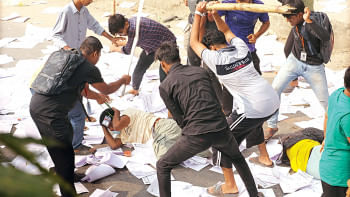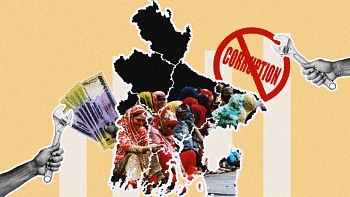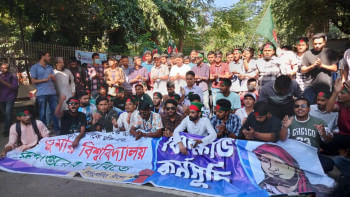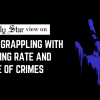Dhaka, a Gotham caught in the crossfire of conspiracies

Dhaka, once teeming with the promise of progress, now finds itself trapped in a coordinated maelstrom of unrest. Blockaded roads, clashing students, and rickshaw drivers paralysing neighbourhoods have become the new norm. The chaos is obvious, but is it organic? Or is it the result of something more insidious—an intricate conspiracy aimed at destabilising the nation? As the capital begins to resemble Gotham City, we are left to wonder: who are the shadowy figures pulling the strings, and why does it feel like there's no Batman, no Commissioner Gordon, to save us?
"You'll hunt me. You'll condemn me. Set the dogs on me," Batman says in The Dark Knight. Bangladesh's interim government, led by Professor Muhammad Yunus, now faces this grim reality as forces both internal and external conspire to bring it to its knees. At the heart of this chaos lies the spectre of the Bangladesh Awami League, a political juggernaut seemingly unwilling to surrender its grip on power. After 15 years of unchecked dominance, its ousting has not led to reflection but vengeance—a desperate gambit to sabotage the nation's fragile stability and prove that no leadership other than its own is viable.
But the AL is not acting alone. Rogue journalists and political influencers, both domestic and foreign, have taken to amplifying discontent under the guise of championing religion and rights. Through provocative rhetoric and selective narratives, they ignite the common people, turning genuine grievances into tools of disruption. Social media, once a platform for connection, has become a battleground where misinformation spreads like wildfire, feeding the flames of chaos.
In Gotham, the Joker's philosophy was simple: "Introduce a little anarchy. Upset the established order, and everything becomes chaos." Similarly, the former ruling party and its accomplices seem intent on engineering crises to discredit the interim government. The protests by battery-operated rickshaw drivers and the violent clashes among students across Dhaka don't appear to be isolated events—they seem like pieces of a broader conspiracy, a strategy to hold the city hostage to fear and uncertainty.
Adding to the storm are whispers of meddling by intelligence agencies from neighbouring countries. These covert operatives, with their vested interest in destabilising Bangladesh, have allegedly penetrated protests and fanned the flames of discord. Their tactics are subtle yet effective—exploiting existing divisions, amplifying religious tensions, and quietly manipulating the public discourse. Dhaka becomes a chessboard, its citizens pawns in a game organised beyond their understanding.
But the AL is not acting alone. Rogue journalists and political influencers, both domestic and foreign, have taken to amplifying discontent under the guise of championing religion and rights. Through provocative rhetoric and selective narratives, they ignite the common people, turning genuine grievances into tools of disruption. Social media, once a platform for connection, has become a battleground where misinformation spreads like wildfire, feeding the flames of chaos.
Consider the clashes at Newmarket between Dhaka College and City College students. What began as a petty quarrel escalated into a battlefield, with lives disrupted and property destroyed. Or the protests by Titumir College students, whose so-called demands for university status devolved into roadblocks and rail disruptions. These incidents are not anomalies—they are symptoms of a city caught in a manufactured storm, where every grievance is magnified, every conflict exploited.
In Gotham, the Joker exploited fear to turn the city against itself. Similarly, Dhaka's conspirators prey on the vulnerabilities of its people. Religious sentiment is weaponised, with influencers stirring unrest under the banner of defending faith. Rights are framed as zero-sum games, pitting communities against each other.
But unlike Gotham, Dhaka lacks its Bruce Wayne—a figure willing to fight from the shadows to restore balance. Instead, its people are left to navigate the chaos on their own, often unwitting participants in a grander scheme. Social media groups, once havens for traffic updates, are now filled with posts of despair: "Is Moghbazar to Tongi road open?" writes one commuter. "Any protests near Motijheel or the Press Club?" asks another. Fear has become a constant companion, and uncertainty, the currency of control.
The Dhaka Metropolitan Police, like Gotham's struggling law enforcement, appears overwhelmed. Their assurances of action ring hollow as unrest continues to spread. Meanwhile, the interim government's pleas for dialogue and order are drowned out by the cacophony of chaos.
"The night is darkest just before the dawn," Harvey Dent declares in The Dark Knight. For Dhaka, this darkness feels unending. But it also presents a choice: to surrender to the manufactured chaos or to rise above it. The responsibility lies not with mythical heroes but with the people themselves.
Citizens must confront the forces exploiting their grievances, whether they are rogue journalists twisting narratives, political influencers inciting division, or foreign agencies interfering in their sovereignty. Responsibility cannot be abdicated to leaders or institutions; it must be claimed by individuals refusing to be manipulated.
In Batman Begins, Bruce Wayne reminds us, "It's not who I am underneath, but what I do that defines me." Dhaka's residents must ask themselves what defines them in this critical moment. Will they continue to be pawns in a sinister game, or will they demand accountability—from their leaders, their media, and themselves?
The AL now finds itself accused of conspiring to undermine the very nation it helped liberate. Its alliances with rogue actors and foreign entities betray desperation to reclaim power at any cost. But as Alfred, Bruce Wayne's loyal butler, observes, "Some men aren't looking for anything logical... They just want to watch the world burn."
Dhaka is no stranger to struggle, but this moment demands more than endurance. It requires vigilance, integrity, and unity. The city may feel like Gotham today, but it need not share its fate. There is no Batman to save Dhaka, no billionaire vigilante to fight its battles. What it has, instead, are millions of ordinary heroes—people who can choose to reject chaos, to question the narratives fed to them, and to demand better from those in power.
As Batman himself says in The Dark Knight Rises, "A hero can be anyone." In Dhaka's darkest hour, heroism lies not in capes or masks but in the courage to see through the conspiracy, to resist manipulation, and to rebuild trust in each other. Only then can the city rise, not as a pawn in someone else's game, but as a beacon of resilience and hope.
H.M. Nazmul Alam is lecturer at the Department of English and Modern Languages of the International University of Business, Agriculture and Technology (IUBAT). He can be reached at [email protected].
Views expressed in this article are the author's own.
Follow The Daily Star Opinion on Facebook for the latest opinions, commentaries and analyses by experts and professionals. To contribute your article or letter to The Daily Star Opinion, see our guidelines for submission.

 For all latest news, follow The Daily Star's Google News channel.
For all latest news, follow The Daily Star's Google News channel. 











Comments